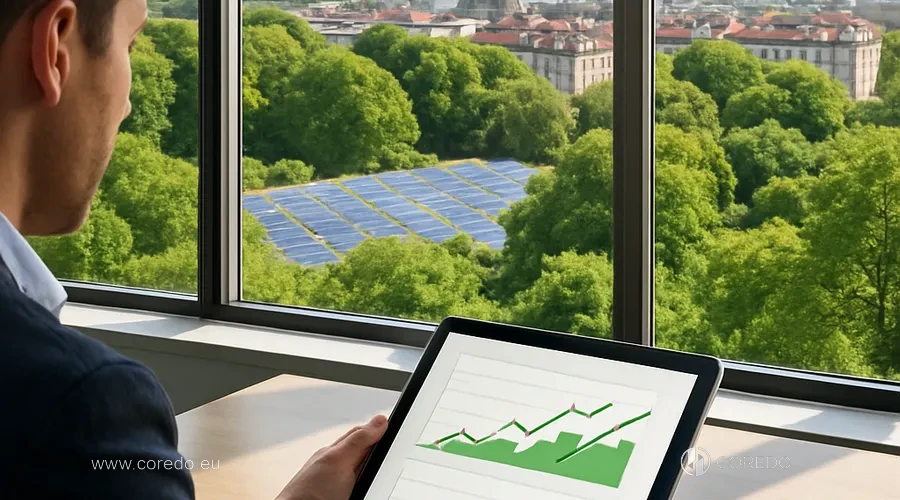In 2024, private capital accounts for more than 60% of all new investments in European innovative companies – a figure that just ten years ago seemed unattainable. However, despite this impressive growth, Europe annually loses up to €300 billion of private investment due to capital migration and insufficient integration of financial markets. Why, possessing such a significant resource, does Europe’s economy face the threat of losing global competitiveness? How can private capital become not only a source of growth but also a guarantee of the EU’s economic security in conditions of geopolitical turbulence and a technological gap with the US and Asia?
These questions worry not only regulators and analysts today, but also entrepreneurs, owners and CFOs who are looking for reliable solutions to scale businesses, attract investment and minimize risks. In this article I share the experience of COREDO in supporting cross-border projects, company registrations, obtaining financial licenses and implementing AML strategies in the EU, Asia and the CIS. Here you will find not only an in-depth analysis of the role of private capital in the European economy, but also practical recommendations that will help your business effectively attract investments, manage risks and take advantage of the opportunities of the European capital market. If you want to understand how private capital can become your strategic advantage, I invite you to read the article to the end.
Private Capital and Europe’s Competitiveness

Private capital has become one of the key factors shaping Europe’s economic dynamics, contributing to industry development and maintaining technological leadership in the face of global competition. The interaction between the state and private capital plays a central role in strengthening Europe’s competitiveness, especially in infrastructure, innovation and international economic relations.
Private capital in the European economy: functions and impact
Private capital: it is not only investment funds private equity and venture capital, but also the assets of HNWI, family offices and corporate investors. Its key function is providing flexibility and speed of financing that are unavailable to the traditional banking sector. COREDO’s practice confirms: in most cases of company registration in the Czech Republic, Estonia, the United Kingdom and Singapore, it is private investments that become the catalyst for a rapid market entry and scaling of new business models.
Unlike government subsidies, private investments are more responsive to market signals, allowing quicker reactions to new trends and market needs.
Private investments and their impact on the economy and innovation
COREDO’s experience in supporting projects to obtain licenses for financial services and launching innovative fintech companies in the EU shows: private investments directly affect economic growth by creating jobs, stimulating R&D and contributing to the development of new industries. Venture capital and private equity are becoming the main sources of funding for deeptech, greentech and biotechnology startups, enabling Europe to narrow the innovation gap with the US and Asia.
They not only promote sustainable development but also increase Europe’s investment attractiveness in the global capital market.
Private capital in the development of the European capital market
The development of the European capital market is impossible without the active participation of private investors. Solutions developed at COREDO for structuring cross-border deals show: the inflow of private capital contributes to the formation of new financial instruments, increases market liquidity and reduces Europe’s economy dependence on bank lending. This is especially important in the context of forming the EU banking union and integrating the internal capital market.
In these conditions, a deep analysis of the characteristics and limitations of private capital in Europe becomes especially important.
Private capital in Europe: challenges and opportunities

Private capital in Europe today faces new challenges: the outflow of wealthy individuals, a difficult economic environment and growing global market competition force investors to seek new ways to preserve and grow their assets. At the same time, these processes open significant opportunities for transforming the financial system and strengthening the role of private investments in the region’s strategic sectors.
Problems of the EU economy and the role of private capital
Despite the growth in private investment volumes, Europe faces a number of structural challenges: market fragmentation, regulatory differences, insufficient transparency and high compliance costs. The COREDO team has implemented projects for company registration and obtaining licenses in the Czech Republic, Estonia, Cyprus and the United Kingdom, which made it possible to identify that effective attraction of private capital requires the harmonization of standards, the unification of KYC/AML procedures and the introduction of digital platforms for investment management.
The impact of capital migration on Europe’s investments
Capital migration: one of the key challenges to the EU’s economic security. According to recent studies, the annual outflow of private investments from Europe to the US and Asia reaches 2% of the region’s GDP. This reduces the competitiveness of the European economy and limits opportunities to finance innovations. COREDO’s experience in supporting international transactions shows that strategic capital migration is often associated with the search for more favorable tax and regulatory conditions, as well as with the high speed of prindecision-making in other jurisdictions.
EU economic security and investment risks
The EU’s economic security directly depends on the ability to effectively manage private capital risks. Key risks include regulatory uncertainty, currency fluctuations, political instability and cyber threats. At COREDO we implement comprehensive AML strategies, develop bespoke solutions for managing investment risks and support clients at all stages of deal structuring, which helps minimize losses and increase business resilience.
Impact of economic and geopolitical factors on private capital
Global economic challenges, inflation, tightening monetary policy, and sanction restrictions significantly affect private capital flows. Geopolitical tension increases demands for transparency and compliance, raises financing costs and reduces risk appetite. COREDO’s experience shows that in times of instability those companies win that proactively adapt their business models to new realities and use multi-stakeholder capital management.
Investment strategies and attracting private capital in the EU

Investment strategies and the attraction of private capital in the EU are becoming key tools to ensure sustainable economic growth and to address the region’s strategic objectives. Modern approaches to capital mobilization create attractive conditions for investors and help maintain the competitiveness of European companies on the global market.
Best practices for attracting investments in the EU
Effective attraction of private capital requires not only a deep understanding of local markets but also the ability to integrate international standards. At COREDO we support projects that use hybrid investment instruments, from convertible notes to SAFE agreements, which helps minimize risks and speed up deals. Among best practices are creating transparent corporate structures, implementing digital platforms for Due Diligence and automating KYC/AML processes.
Venture and private equity capital in the development of European companies
Venture capital and private equity play a key role in scaling businesses, especially in high technology, biotechnology and sustainable development sectors. COREDO’s experience in supporting venture deals in Estonia and Singapore has shown that having a professional fund manager, a transparent governance structure and a clear exit strategy significantly increase the chances of success and attracting new funding rounds.
Thus, the success of venture and private equity investments directly depends on the prudent use of modern financial instruments, which will be discussed in more detail below.
Financial instruments for investment management
Modern financial technologies (FinTech) enable automation of investment portfolio management, reduce transaction costs and provide transparency for all market participants. ESG investments are becoming an integral part of private capital strategies, reflected in the growing number of specialized funds and the adoption of sustainable finance standards. COREDO’s solutions for integrating FinTech platforms and implementing ESG metrics allow clients not only to meet current requirements but also to increase the investment attractiveness of projects.
Regulation and taxes affecting capital inflow
Regulation of private investments in the EU is highly detailed and requires deep knowledge of local legislation. Different EU countries have their own tax policy features that affect deal structures and the choice of jurisdiction. COREDO’s experience in registering companies in Cyprus, the United Kingdom and the Czech Republic confirms that competent tax optimization and the use of international investment agreements can significantly reduce costs and increase investment returns.
Private capital and the sustainable development of the European economy

Private capital is becoming a key driver on the path to the sustainable development of the European economy. With accelerating technological and climate changes, the role of private investments is growing, especially in projects focused on decarbonization and the “green” transition.
Private investments in Europe’s decarbonization
Private capital is a key source of financing projects for the decarbonization of the European economy. In recent years COREDO has supported several major deals to attract investment in renewable energy and projects to reduce carbon footprint. Private investments help accelerate the adoption of innovative technologies, support clean energy startups and contribute to achieving the goals of the European Green Deal.
Private capital and the green economy: financing sustainable projects
The green economy requires long-term investments that private funds and HNWI are ready to provide. In COREDO’s practice special attention is paid to projects that meet the principles of sustainable development and corporate social responsibility (CSR). Using ESG criteria when evaluating projects not only reduces risks but also attracts additional financing from international investors.
The impact of digital transformation on investments in private capital
The digital transformation of the European economy opens new opportunities for private investors. The adoption of blockchain technologies, automation of compliance, development of digital platforms for investment management — all this increases deal efficiency and transparency. The COREDO team has implemented several projects to launch digital funds and the tokenization of assets, which enabled clients to enter new markets and attract capital from Asia and the Middle East.
CSR and multi-stakeholder capital management
MulStakeholder capital management is becoming the standard for European companies focused on long-term development. The application of CSR principles allows not only to strengthen reputation but also to increase business resilience to external shocks. At COREDO we integrate CSR strategies into corporate governance, which helps attract new investors and strengthen clients’ positions in international markets.
Long-term consequences of private capital in Europe

The long-term consequences of private capital in Europe affect not only financial flows, but also the resilience of economic institutions, the dynamics of innovation and the structure of investments. Understanding these processes is especially important today, as the European market faces new challenges, including increased capital outflows and changes in the global economy.
Long-term consequences of capital outflow from the EU
Private capital outflows lead to lower economic growth rates, a reduction in the number of innovative companies and an increased technological gap with the US and Asia. To minimize these consequences, structural reforms are needed aimed at improving transparency, reducing regulatory barriers and encouraging long-term investments. COREDO’s experience in supporting capital reintegration projects shows that creating a favorable environment for investors is the key to the sustainable development of Europe’s economy.
The EU banking union and the private capital market
The formation of the EU banking union contributes to the unification of standards, the reduction of transaction costs and increased confidence in the region’s financial markets. This creates additional incentives for attracting private capital and developing new financial instruments. At COREDO we track all changes in the regulatory environment and help clients adapt to the new requirements of the banking union.
Joint projects and their impact on investments
Joint public projects, such as pan-European funds and infrastructure programs, play an important role in shaping a positive investment climate. They help reduce risks for private investors, provide co-financing and accelerate the implementation of strategic initiatives. COREDO’s practice confirms that participation in such projects increases trust in business and opens access to additional sources of financing.
Strategies for integrating European financial markets
Integration of financial markets is a key factor in enhancing the competitiveness of the European economy. It ensures the free movement of capital, the unification of standards and access to new sources of financing. COREDO’s solutions for structuring cross-border deals and optimizing corporate structures enable clients to effectively use the advantages of an integrated EU market and minimize regulatory risks.
Recommendations for entrepreneurs and investors
Recommendations for entrepreneurs and investors in the European context are becoming increasingly relevant amid major changes in regulation, the economy and security. Attracting and effectively managing private capital today requires a deep understanding of European specifics and modern tools for operating in a rapidly changing market.
How to attract and manage private capital in Europe
To successfully attract private capital, it is important not only to choose the optimal jurisdiction but also to build a transparent corporate structure that complies with international compliance standards. COREDO’s experience shows that implementing digital platforms for investment management, automating KYC/AML and integrating ESG metrics significantly increase the chances of attracting investors.
Risk management and ROI assessment
Effective risk management requires a comprehensive approach: from portfolio diversification to implementing hedging tools and regular monitoring of regulatory changes. Methods for assessing ROI in Europe include not only financial indicators but also non-financial metrics: ESG indices, level of innovativeness, social impact. COREDO’s solutions allow integrating these metrics into the corporate governance system and making more balanced investment decisions.
Table: ROI metrics for evaluating private investments in Europe
| Metric | Description | Application |
|---|---|---|
| IRR (Internal Rate of Return) | Internal rate of return | Private equity, venture funds |
| MOIC (Multiple on Invested Capital) | Multiple on invested capital | Startups, venture investments |
| ESG indices | Assessment of environmental, social and governance factors | Sustainable financing |
| Payback Period | Payback period | Infrastructure projects |
Financial instruments and technologies for business growth
Scaling a business through private capital requires the use of modern financial instruments — from convertible loans to tokenized assets. Implementing FinTech solutions speeds up due diligence processes, increases transparency and reduces costs. COREDO’s practice demonstrates that integrating digital platforms and automating capital management are becoming the standard for successful companies in the European market.
How to adapt to EU tax changes?
Regular monitoring of changes in the tax and regulatory environment is a necessary condition for long-term success. COREDO’s solutions include the development of individual tax optimization strategies, the use of international agreements and the implementation of automated compliance systems. This allows clients to respond promptly to changes and minimize tax and regulatory risks.
Key findings and prospects
Private capital, a key driver of the competitiveness of the European economy, a source of innovation and sustainable development. Its role is increasing amid global challenges, the integration of financial markets and digital transformation. New opportunities are opening up for businesses and investors: from financing green prfrom projects to scaling through cross-border deals. At the same time, success requires a systemic approach: transparency, risk management, adaptation to regulatory changes and implementation of ESG standards. COREDO’s experience confirms: strategic partnership, deep market understanding and comprehensive support – the key to effectively attracting and managing private capital in Europe.